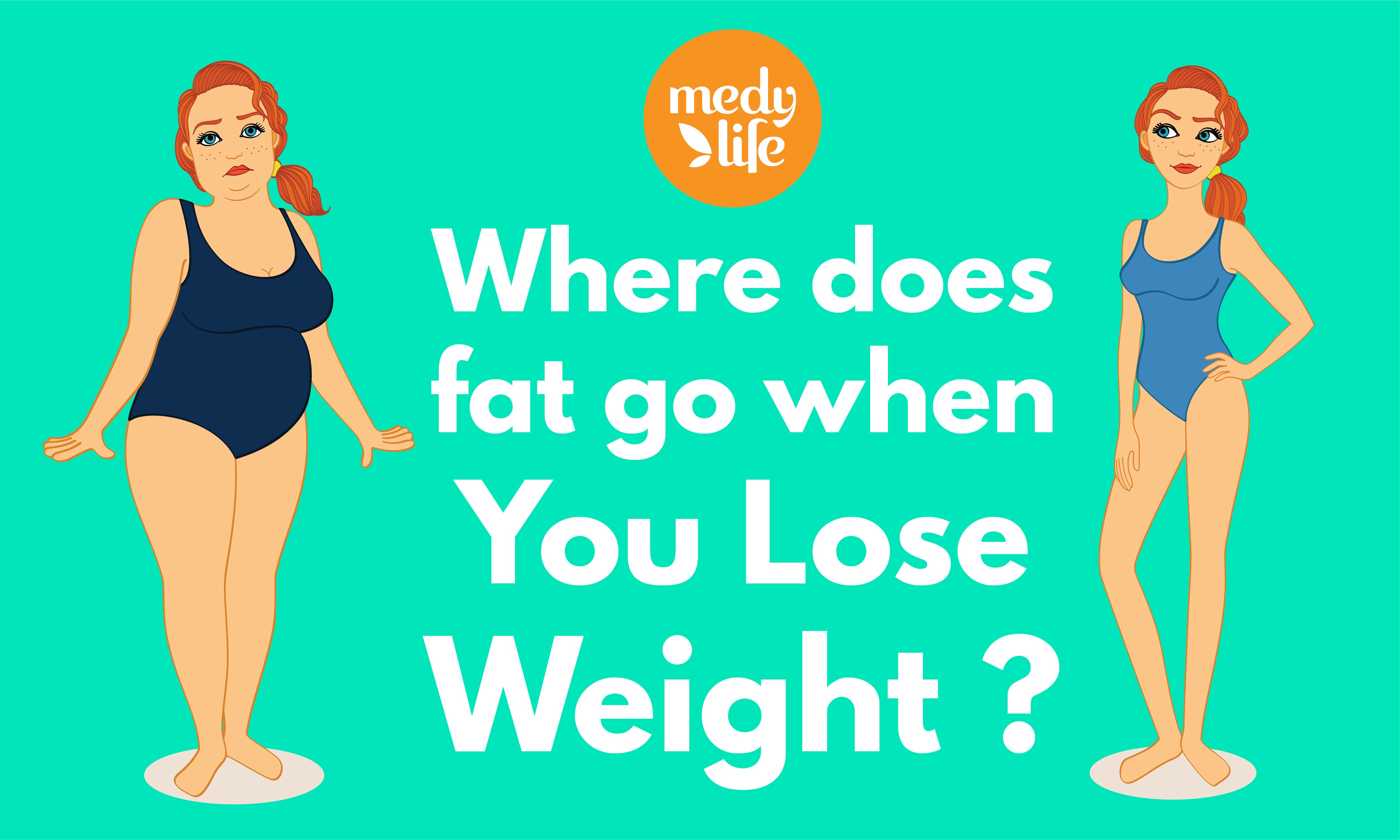
Where Does Fat Go When You Lose Weight?
10-12-2018 | Posted By: Shagun Parasher | 4004 View(s)
Almost everybody is keen to get lean nowadays. But with a lot of facts related to shedding kilos or pounds, one of the most asked questions is Where Does Fat Go when you lose weight. In this article, we are going to talk about everything you need to know about losing fat when you are in your weight loss regime.
All about Storing Fat
How we gain weight and the way fat deposits in our bodies depends on the way our body stores and uses energy. Gaining weight is a consequence of three factors;
• The amount of calories you take,
• The metabolism of the body in turning these calories into energy,
• How much you involve in any physical activity.
The ICMR recommendation for the number of calories a healthy man should take is 2500 kcals, and for a healthy woman, it is 2000 kcals. It is, however, different for people of different age groups. How much your body has used in a day is determined by the number of calories you have consumed versus how many of them you used in physical activity. Any calories that are not used by your body are stored as fat deposits or reserves for their later use.
So, if you are planning on to losing weight, you need to focus on your calorie intake and involving in physical activity to burn the fat stores into energy. The excess carbohydrates and proteins are converted into triglycerides, which are a form of fats found in the blood. They are made up of carbon, hydrogen and oxygen. These triglycerides are then stored in our bodies in the shape of little drops. When you try to lose weight, your body tries to get rid of these triglyceride droplets. But the question again arises, Where Does Fat Go when you lose weight? Hold on with us. You are about to find out.

How the Body Uses Fat?
Our body uses fat to store energy and meet its demand for energy when you do not consume food (in layman terms). The excess carbs and proteins you consume are converted into triglycerides and stored in the body. When your body needs energy, these are broken down and released into your bloodstream. From there the mitochondria of cells come into action and ATP (Adenosine triphosphate) and makes energy. The body then uses this energy for performing operations.
The Million Dollar Question: What Happens to the Fat?
Most professionals do not have any idea about what happens to fat when you lose weight. According to a study conducted by UNSW Science in Sydney exactly told what happens with your fat when you lose weight. Most say it is lost in the form of sweat. But it is not entirely so. Some say that it is lost in the form of heat and energy, but this saying is exactly opposite to the law of conservation of energy. According to the study, We Breathe the Fat Out. Yes, you read it right.
The results of UNSW Science in Sydney were published in the British Medical Journal revealed that 10 kg fat turns into 8.4 kg of carbon dioxide, that is exhaled when you breathe, and the left 1.4 kg is excreted out in the form of water through urine, tears, sweat and other body fluids. Most of the doctors, dieticians and fitness trainers do not know the real truth behind the fat loss.
We put on weight when the carbohydrates and proteins we consume are converted into triglycerides and stored in the form of liquid droplets in the fat cells of the body. For losing weight, it is necessary that your body breakdowns the triglycerides to access the carbon.
If you wish to lose weight, here are some calculations you need to understand.For the complete breakdown of 10kg of human fat, a person needs to inhale 29 kg of oxygen, which will burn around 94,000 calories. This reaction produces somewhat around 28 kg of CO2 and 11 kg of H2O, i.e. Carbon dioxide and water respectively. These calculations say that the lungs are the primary organs for fat loss. But this does not mean that only breathing is going to burn all the fat. You need to exercise to unlock the carbon and break down the fat. We breathe for around 12 times a day that means 17,280 times in a day. It is impossible to lose weight solely through breathing out the carbon dioxide. One needs to involve in physical activity and healthy eating practices to lose fat.
Why does Fat Increases for Most People?
It is no secret that the rates of obesity have been growing at a high incidence worldwide. Many factors contribute to obesity. Let us discuss them briefly. They as under:
1. Eating more and more packaged and processed foods are one of the primary reasons that lead to obesity in people. These days people depend on such foods, keeping aside the importance of eating green leafy vegetables and fruits. This results in many health risks.
2. Increased stress levels amongst the generation, which means less or no time for involving in healthy practices and exercises, less time for sleeping and eating when distracted. A person should remain stress-free to lead a healthier life.
3. No physical activity- With the advancement of technology and facilities available on a click, people have become lazy. This has led to decreased physical activity amongst the youth and hence, obesity.
4. Inability to Arrange Food- For the minor communities, it’s hard to arrange food for a living. Some have trouble affording healthy food. Such disadvantaged communities have a higher risk of obesity than more affluent individuals of the same age.
Out of the fat accumulated throughout the body, the most harmful is the belly fat. Here are the reasons why you should lose fat.
Why is it important to Lose Fat?
1. To Live Longer
The people with larger waist sizes are at a higher risk of life-threatening diseases. People with more prominent fat are at higher risk of heart disease and diabetes. All our body organs have a natural lining of fat. Abdominal fat or obesity directs that the lining of fat around the organs has increased. It is a must that you start working out and limit your calorie intake if you notice any fat accumulation in your body to live longer.
2. Lose Fat, Sleep Tight
Having a big belly and neck can lead to chronic and loud snoring, and this may result in Sleep Apnea which is a sleep disorder. People, who go through sleep apnea stop breathing for a few seconds to several times a night, wake up tired and exhausted. Losing fat can help you sleep better.
3. Fat causes High Blood Pressure
This has a simple reason why. Your heart has to work harder to ensure that the entire body gets its nutrients. The heart has to work twice as more to make sure that the whole body gets the necessary supply of blood. This is also what leads to chronic fatigue and why an overweight person feels tired all the time.
How to Lose Fat
Here are some ways by which you can lose fat, especially from your midsection, i.e. Belly Fat.
1. Eat more Fat Burning Foods
Focus on eating more fat burning foods such as green leafy vegetables and fruits, high fibre foods, whole grains, etc. Get rid of processed and packaged items if you want to shed fat around the belly.
2. Stay away from Calories
If you want to lose fat, it is just that you keep away from the carbs. Food items such as carbonated drinks, refined grains, sweetened foods, etc. are high in calories. These should be avoided if you want to lose fat from the body.
3. Eating consciously
Eating consciously means being aware of the satisfaction you receive after eating food. Eating while distracted or emotional is also not the right way to eat. Eating healthily, taking a good time while eating, staying away from T.V., files, books, work etc. while eating is very important to support long-term health.
4. Exercise
You must work out for at least 50-60 minutes a day to lose weight and fat. People who engage in high-intensity aerobic workout tend to be leaner.
The Bottom Line
This was about Where Does Fat Go when you lose weight. We discussed why the fat accumulates in your body and the reasons why you should lose it. We also mentioned some ways by which you can lose the stubborn fat and stay fit throughout a long time. We hope that you find this post useful. If you find something difficult to understand, feel free to ask us in the comments below. If you find this post useful, please do share with us below. Stay Healthy, Live Long.


